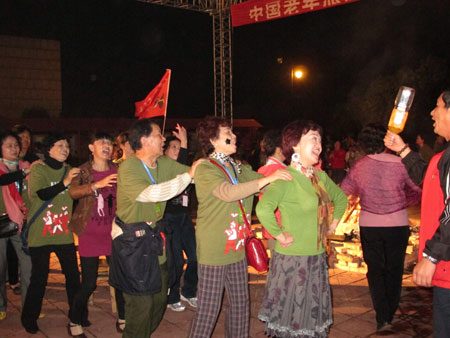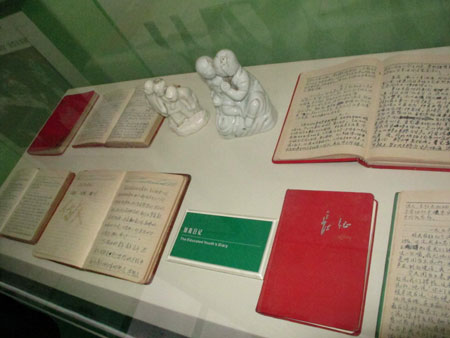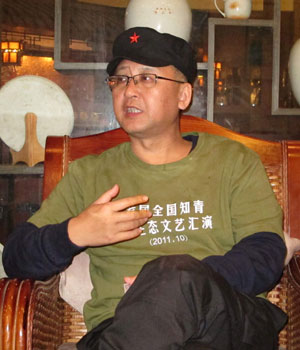Remembrance of things past
Updated: 2011-11-08 07:54
By Wang Kaihao (China Daily)
|
|||||||||
|
 Former zhiqing celebrate the opening of Jianchuan Zhiqing's Life Museum in Anren, Chengdu, Sichuan province. Photos by Wang Kaihao / China Daily |
|
Exhibits at the museum include articles of daily use, diaries and files relevant to zhiqing. |
What is claimed to be the largest museum in the country dedicated to 'intellectual youths' who were sent to the countryside has just opened. Wang Kaihao reports.
At a recent bonfire party in Anren, a town about 40 km from Chengdu, capital of Sichuan province, more than 300 people, mostly in their 50s or 60s, circle the fire chanting and addressing one another as "comrades in arms".
They are former zhiqing, or "intellectual youth". They are mostly young people from urban areas, approximately 17 million of whom were sent to the countryside between the early 1950s and the late 1970s, peaking in number during the "cultural revolution" (1966-1976).
The bonfire revelers at the opening ceremony are the first visitors to Jianchuan Zhiqing's Life Museum, which is the 15th museum built by Fan Jianchuan, a 54-year-old real estate agent and former zhiqing.
Among the previous 14 museums, four are themed "Red Age Series", referring to the years since the founding of People's Republic of China in 1949 to the reform and opening-up policy of the late 1970s.
Fan spent 30 million yuan ($4.76 million) building the zhiqing museum, which is 3,000 square meters, and claims it is the nation's largest museum dedicated to zhiqing.
Fan says he is waiting for government approval to officially open and says this will likely come soon.
About 5,000 exhibits have been selected from 500,000 letters, 20,000 diaries and 200,000 photos, in addition to articles of daily use and files relevant to those years. Fan says most items have been donated by former zhiqing.
"It's meaningful and responsible to record that period of history and this special group," says Fan, who jokes that he is a "collectormaniac".
Referring to the exhibits, Ma Bo, a Beijing-based writer who was sent to the Inner Mongolia autonomous region for eight years as a zhiqing, says: "It makes me feel like I returned to the grasslands and gives me a lot of inspiration for future writing."
Ma is best known for writing several novels about zhiqing lives.
|
Fan Jianchuan, 54, an estate agent, has built an "intellectual youth" or zhiqing themed museum. Photos by Wang Kaihao / China Daily |
Ten tombstones stand at the entrance of the museum, commemorating the 10 girls from Chengdu who died in a fire at their dormitory just seven days after they arrived in Yunnan province, in 1971. The tombstones also represent all the zhiqing who lost their lives in accidents and didn't have the opportunity to return home.
"They're the deceased versions of ourselves, and we are the living versions of them," Ma says, laying a wreath at the tombstones.
The interior walls of the museum are painted green to represent the lives of zhiqing in the countryside. Meanwhile, an atrium full of broken mirrors and farm tools in the middle of the building represents fractured lives.
"It is hard to make the broken mirrors intact again, just like the zhiqing."
Fan's exhibition eschews slick production values and has just a few TV sets showing documentaries about zhiqing.
"Let the history talk was my idea for organizing the exhibition," Fan says.
He adds there is a variety of sections so it is not too "depressing". One is called "tribulation" and reflects the toughness, homesickness and frustration of the zhiqing. Another features inspiring profiles to show how young people encouraged themselves and overcame their difficulties.
The vast majority of zhiqing only received elementary or high school educations when they adopted farmers' lives.
Although some zhiqing continued their educations, and some took national college entrance exams after they were restored in 1977 - including the director Zhang Yimou and composer Tan Dun - others struggled to make a living after they returned home because of their lack of education.
"I feel frustrated that we lost our golden years when we should have learned so much on campus," Zeng Yongqing says. The 56-year-old from Chongqing, who left his home at age 16 and stayed in Yunnan province for seven years, returned home just once a year.
"Every time I returned to the countryside, I missed my home more," he says.
Zeng once petitioned the Yunnan government to return home and is surprised to find himself in an old photo in the museum.
"We contributed to ending the historic campaign," a nostalgic Zeng says, looking somber.
Some of his "comrades in arms" from those years, however, are more positive about their experiences.
"Those three years as a peasant enriched my life and taught me lots of living skills," Beijinger Tan Jianhua says.
Nevertheless, the 57-year-old woman weeps at the opening ceremony, and it's not difficult to find others crying, too.
Hou Jun, 68, who voluntarily went to the countryside in 1962 and was consequently honored as a "model zhiqing", appears sentimental when she steps into the hall full of pictures and objects that take her back in time.
"We got old," Hou says. "However, the contribution we made to our country should never be forgotten. Young people today should be inspired by our strong and diligent spirit," she says and points to a slogan on the wall written by Fan. It reads: "That period of time was our blooming youth, no matter whether we have regrets or think it was wasted."













